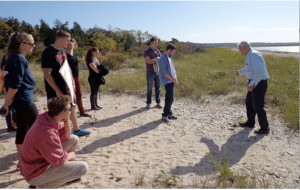When it comes to being a college student, it’s not always easy to minimize your environmental impact. While use of the Internet and other technologies like e-textbooks has become more common in recent years, most classes still require that you use at least some paper to take exams, complete assignments, write notes and review class readings.
But this past semester, Stony Brook University Sustainability Studies Program professors Dr. Arlene Cassidy and Dr. Anthony Dvarskas created a completely paperless course based on the use of electronics to minimize the class’ environmental impact while maintaining high educational standards and increasing students’ exposure to the use of technology in education.
To eliminate the need for paper printed textbooks, exams, paper presentations, homework, scheduling and other course-related items for their course–SBC 401: Integrated, Collaborative Systems–Cassidy and Dvarskas used an “E grant” (a college grant for the use of technology for educational purposes) to obtain electronic tablets for each student.
The professors also used Blackboard, Stony Brook University’s online course-support platform and email to communicate with students, distributing Internet-based reading material, projects, tests and announcements. Besides communicating with their professors, students collaborated with each other online, sharing data and projects, as well as creating group presentations. Additionally, all scheduling and student/course evaluations were completed online.
Want to learn more about SBC 401?
Drs. Cassidy and Dvarskas describe the course below:
“The primary course objectives of SBC 401 are to develop a way of thinking about complex systems in present-day society, and to provide the necessary research, communication, and team-based skills to address the complex problems involved with coastal regions. The course is organized as a seminar/research project course. As part of the course, the instructors provide practical training in the skills needed to work in teams to conduct research and communicate the results. The teams of students develop a project related to coastal restoration, collect the necessary data (either from databases or through limited field work), analyze the data, and synthesize their findings into a presentation at the end of the semester.
This fall, the focus of the course was on an issue very important here on Long Island: coastal restoration. Several people in the Stony Brook University community have been and are involved with coastal restoration projects and were able to share their expertise and research with the students. Students also were able to gain on site experience visting two local beach restoration projects; West Meadow Beach and Sunken Meadow’s beaches.”
 Arlene Cassidy, Ph.D.
Arlene Cassidy, Ph.D.
Environmental Economist, Lecturer and Director
Sustainability Studies
Sustainability Studies Program
Anthony Dvarskas, Ph.D. Environmental Economist, Coastal Environmental Scientist, Lecturer
Environmental Economist, Coastal Environmental Scientist, Lecturer
Sustainability Studies Program


